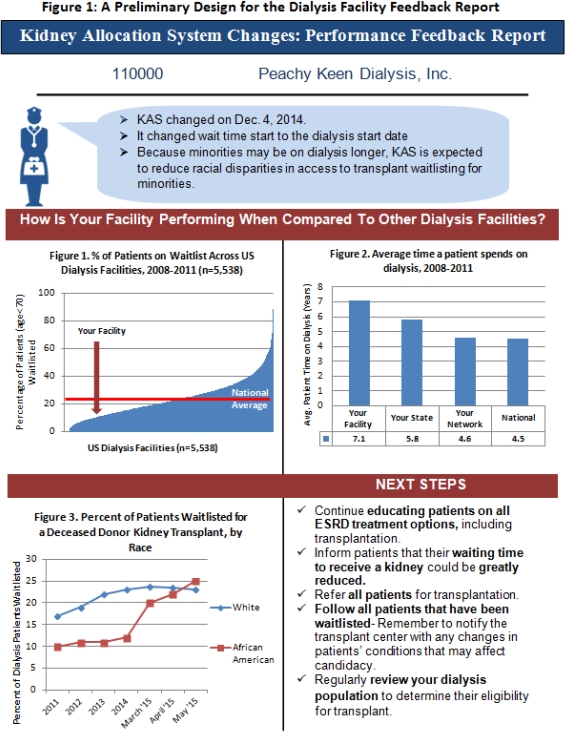Intervention Development for the Allocation System Changes for Equity in kidNey Transplantation (ASCENT) Study.
1Emory University, Atlanta, GA
2Columbia University, New York, NY
3American Association of Kidney Patients, Tampa, FL
4Southeastern Kidney Transplant Coalition, Atlanta, GA
5National Kidney Foundation, Atlanta, GA
6University of South Carolina, Columbia, SC
7ESRD Network 2, Lake Success, NY
8ESRD Network 6, Raleigh, NC.
Meeting: 2016 American Transplant Congress
Abstract number: 173
Keywords: Patient education, Public policy, Waiting lists
Session Information
Session Name: Concurrent Session: Novel Predictors of Outcome, Big Data and Technology
Session Type: Concurrent Session
Date: Monday, June 13, 2016
Session Time: 2:30pm-4:00pm
 Presentation Time: 2:54pm-3:06pm
Presentation Time: 2:54pm-3:06pm
Location: Room 302
Background: Recent changes in the kidney allocation system (KAS) are expected to reduce racial disparities in kidney transplantation (KTx). However, dialysis facilities may not be aware of how KAS could improve equity in KTx access among patients, making educational outreach crucial.
Methods: We assembled a diverse, interdisciplinary Dissemination Advisory Board (DAB) of stakeholders in July 2015 to oversee intervention development for the Allocation System Changes for Equity in kidNey Transplantation (ASCENT) Study, a multicomponent, randomized clinical effectiveness study in ~750 U.S. dialysis facilities among 11 ESRD networks with racial disparities in waitlisting.
Results: The DAB is composed of academic faculty, KTx physicians, dialysis facility medical directors, patients, patient advocacy groups, a behavioral scientist, a social worker and government regulatory agency representatives. Divided into 3 subcommittees based on targeted intervention groups (patients, staff, and dialysis facility medical directors), DAB members are developing a multicomponent intervention (videos, webinar, and performance feedback reports) to educate targeted groups about KAS changes and their impact on dialysis patients and racial disparities in KTx  .
.
Conclusion: Formative testing of ASCENT intervention materials will be conducted to ensure they are tailored to each targeted group. In the large clinical effectiveness study, we will administer the validated materials and assess their impact on improving KAS knowledge among medical directors and on reducing disparities in KTx waitlisting.
CITATION INFORMATION: Smith K, Gander J, Basu M, Pastan S, Mohan S, Escoffery C, Plantinga L, Kalloo S, Green G, Berlin A, Renville G, Browne T, Turgeon N, Caponi S, Krisher J, Patzer R. Intervention Development for the Allocation System Changes for Equity in kidNey Transplantation (ASCENT) Study. Am J Transplant. 2016;16 (suppl 3).
To cite this abstract in AMA style:
Smith K, Gander J, Basu M, Pastan S, Mohan S, Escoffery C, Plantinga L, Kalloo S, Green G, Berlin A, Renville G, Browne T, Turgeon N, Caponi S, Krisher J, Patzer R. Intervention Development for the Allocation System Changes for Equity in kidNey Transplantation (ASCENT) Study. [abstract]. Am J Transplant. 2016; 16 (suppl 3). https://atcmeetingabstracts.com/abstract/intervention-development-for-the-allocation-system-changes-for-equity-in-kidney-transplantation-ascent-study/. Accessed February 18, 2026.« Back to 2016 American Transplant Congress
